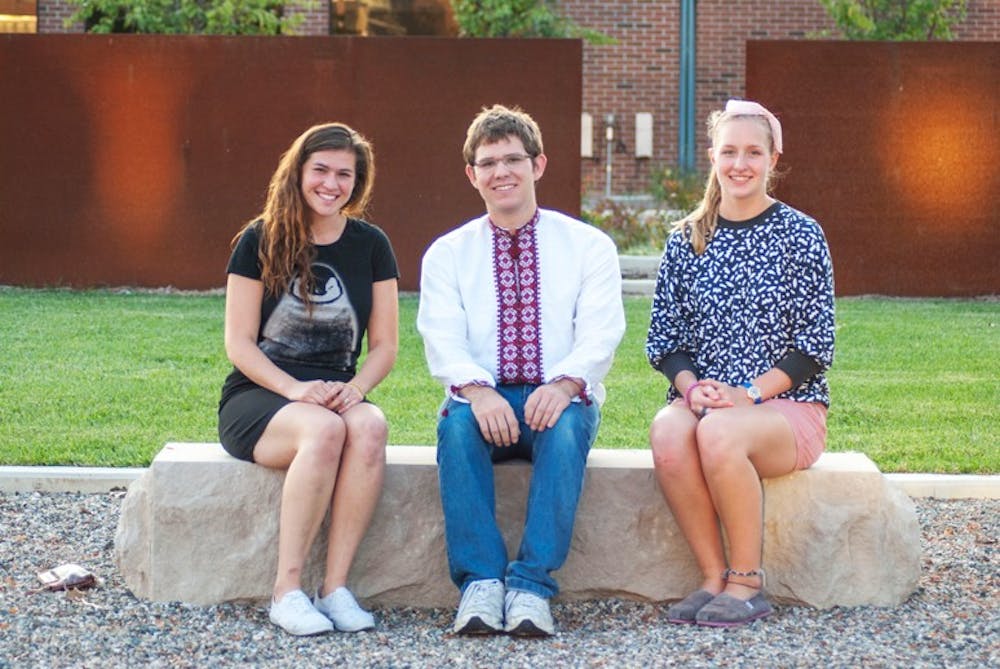By Joe Friedrichsen | Echo
Americans can easily feel disconnected from the conflict in Ukraine because of the U.S.'s physical distance from the country. But for sophomore Ashley Burkett, the pain of the conflict is all too real and much closer to home.
Since March, the Ukrainian government has been engaged in armed conflict with separatist forces from the self-declared Donetsk and Lugansk People's Republics in eastern Ukraine. The conflict originated from pro-Russian and anti-government protests following the annexation of Crimea by Russia.
Many people from Burkett's province, Volyn Oblast, went to the Euromaidan in Kiev from March to November to protest against Viktor Yanukovych, the Ukrainian president at the time.
The Euromaidan was a wave of demonstrations andcivil unrest that began on the night of Nov. 21, 2013. Large public protests took place in Maidan Nezalezhnosti (Independence Square) in Kiev. Protesters demanded closer integration with the EU.
Burkett, who was born in western Ukraine and lived there for 13 years, said 35 people from her region died in the protests.
"A lot of pain is going on, and there is a lot they (west Ukrainians) are trying to work through, especially in our city (Lutsk)," Burkett explained.
Freshman Joseph Mosse also grew up in Ukraine, in a city bordering the southern Black Sea called Odessa.
He recalled the port city having a unique culture with many foreigners and diverse groups. It is more evenly divided in terms of pro-Russian views and pro-Ukrainian views.
During the riots that happened in Odessa on May 2, 2014, Mosse said he had friends at his house and was celebrating with them. So, it was a weird feeling for him when he started hearing about the riots. The situation frightened him because his sister almost walked into the riot, which happened right next to their school.
"That was the worst day. The next day, and for the next two weeks, it was like a ghost town," Mosse said. "After that time, people started coming out. The general feeling afterward was that it didn't matter if you're pro-Russian or pro-Ukrainian. This was a tragedy. This wasn't meant to happen. We're better than this."
The riots in Odessa were a result of clashes between pro-Ukrainian and pro-Russian groups. These clashes culminated into a large skirmish outside the Trade Unions House, an Odessa landmark located in the city center. The building caught fire in unclear circumstances, killing 42 pro-Russian activists holed up in the building. Six others were killed in street clashes.
In the east, the conflict has further polarized Ukrainian society, pushing the pro-Russian and pro-Western sides even further apart. Additionally, many western Ukrainians have relatives, friends and other connections in eastern Ukraine. This makes the conflict a difficult topic to discuss with friends and family.
Junior Jana Selig lived in Russia but said she doesn't talk about Ukraine with her Russian friends because the topic is so controversial. Selig was born in Chelyabinsk, Russia, but moved to Germany in 1998. Her mother has a friend from western Ukraine but dislikes discussing the conflict in eastern Ukraine, because it only sparks arguments between them.
Commenting on the travel experiences of a Ukrainian couple she knew from the Russian church her family attended, freshman Alison Broersma said they would always have problems with security when going in and out of Ukraine and Russia, especially when going into Ukraine.
Broersma was just one year old when her family moved to Moscow, Russia, as missionaries. She lived there until she was 17 but moved back to the U.S. this year.
"No one is happy with the current situation in Ukraine," Burkett said.
Ukrainians are questioning how they got from having peaceful protests and wanting to have a voice to a divided country with thousands of people dying.
Overall, Mosse said, "The general attitude in Ukraine is that we just want there to be peace."





